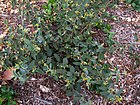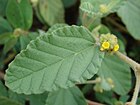Note: This is a project under development. The articles on this wiki are just being initiated and broadly incomplete. You can Help creating new pages.
Waltheria indica
Waltheria indica is a short-lived, perennial plant producing several erect or ascending stems that that can be branched from the base. The stems become more or less woody and persist. The plant can grow from 0.5 - 2 metres tall. The plant is harvested from the wild for local medicinal use and is also the source of a fibre.
Contents
- 1 Uses
- 2 Parts Used
- 3 Chemical Composition
- 4 Common names
- 5 Properties
- 6 Habit
- 7 Identification
- 8 List of Ayurvedic medicine in which the herb is used
- 9 Where to get the saplings
- 10 Mode of Propagation
- 11 How to plant/cultivate
- 12 Commonly seen growing in areas
- 13 Photo Gallery
- 14 References
- 15 External Links
Uses
Fever, Syphilis, Coughs, Colds, Bladder ailments, Vaginal infections, Hypertension, Ulcers, Wounds.[1]
Parts Used
Chemical Composition
Based on these results, this extract was fractionated and led to the isolation of three alkaloids (adouetin X (1), waltheriones A (2) and C (3)) and three pentacyclic triterpene derivatives (betulinic acid (4), 3β-acetoxy-27-trans-caffeoyloxyolean-12-en-28-oic acid methyl ester etc.[2]
Common names
| Language | Common name |
|---|---|
| Kannada | |
| Hindi | |
| Malayalam | |
| Tamil | |
| Telugu | |
| Marathi | |
| Gujarathi | |
| Punjabi | |
| Kashmiri | |
| Sanskrit | |
| English |
Properties
Reference: Dravya - Substance, Rasa - Taste, Guna - Qualities, Veerya - Potency, Vipaka - Post-digesion effect, Karma - Pharmacological activity, Prabhava - Therepeutics.
Dravya
Rasa
Guna
Veerya
Vipaka
Karma
Prabhava
Habit
Identification
Leaf
| Kind | Shape | Feature |
|---|---|---|
Flower
| Type | Size | Color and composition | Stamen | More information |
|---|---|---|---|---|
| {{{5}}} |
Fruit
| Type | Size | Mass | Appearance | Seeds | More information |
|---|---|---|---|---|---|
Other features
List of Ayurvedic medicine in which the herb is used
Where to get the saplings
Mode of Propagation
How to plant/cultivate
Succeeds in a wide range of soils. The plant is a ubiquitous weed and early colonizer in disturbed ground, tolerant of a wide spectrum of habitats and elevations.[4]
Commonly seen growing in areas
On rocky hills, On gravelly soil, Grassy plains, Flooded areas.
Photo Gallery
References
- ↑ Indian Medicinal Plants by C.P.Khare
- ↑ Chemical constituents
- ↑ [Morphology]
- ↑ Cultivation
External Links
- Ayurvedic Herbs known to be helpful to treat Fever
- Ayurvedic Herbs known to be helpful to treat Syphilis
- Ayurvedic Herbs known to be helpful to treat Coughs
- Ayurvedic Herbs known to be helpful to treat Colds
- Ayurvedic Herbs known to be helpful to treat Bladder ailments
- Ayurvedic Herbs known to be helpful to treat Vaginal infections
- Ayurvedic Herbs known to be helpful to treat Hypertension
- Ayurvedic Herbs known to be helpful to treat Ulcers
- Ayurvedic Herbs known to be helpful to treat Wounds
- Herbs with Leaves used in medicine
- Herbs with Roots used in medicine
- Habit - Perennial
- Index of Plants which can be propagated by Seeds
- Herbs that are commonly seen in the region of On rocky hills
- Herbs that are commonly seen in the region of On gravelly soil
- Herbs that are commonly seen in the region of Grassy plains
- Herbs that are commonly seen in the region of Flooded areas
- Herbs








